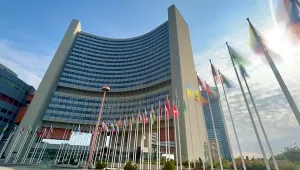Terrorists and would-be terrorists don't deserve appeasement and legitimization of grievances simply because they have used violence to capture the world's attention. We've wasted enough time ignoring the most deserving by pandering to the bullies on the international playground.
Don't focus just on terrorist bullies
By Brenda Shaffer
CAMBRIDGE, MASS. - I have plowed through hundreds of articles and many books on international relations, and, at the end of the day, my children's questions on power relations in the playground seem to be more relevant than the most serious ones posed by academics: "Why do the bullies always win?"
The same could be asked of the international system. In recent years, the international community has rewarded the naughty and neglected the nice. Hundreds of groups are stateless or discriminated against in their home states, yet only a small minority employ terror.
But it is these violent groups who have attained a place on the international agenda. Meanwhile, the poorest nations of the world who are not using terrorist actions to call attention to their plight remain nearly invisible to international aid donors.
In the past year, Washington's mantra has been "poverty breeds terror." Sympathizers with the perpetrators of the Sept. 11 attacks claim that the terrorists who killed more than 3,000 people were driven to do it by the humiliation they suffered in their impoverished homelands.
This line of reasoning only causes unnecessary guilt for the deprivation in the Arab world - a land of abundant oil resources enjoyed lavishly by the Arab ruling families. Research shows that it is from these relatively wealthy, well-educated classes that perpetrators of terrorism - including the Sept. 11 terrorists - usually come.
This issue of rewarding the bully extends to those nations involved in the proliferation of weapons of mass destruction. North Korea had violated its commitment to the Nuclear Nonproliferation Treaty by allocating meager resources to building nuclear weapons instead of to feeding a starving population. What did the US give Pyongyang in response in 1994? A whole package of goodies along with a request to not be naughty again. This year, North Korea revealed that the gifts were lavished in vain. Pyongyang continued its drive to build nuclear weapons while still under the shroud of the treaty, which it broke from last week.
In contrast, during the first part of the last decade, the Republic of Kazakhstan voluntarily surrendered its Soviet-era nuclear weapons for demolition. However, it received little recognition or security compensation for the risk it took in order to improve regional security and ensure that these weapons would not fall into other hands.
In the past year, the US has invested millions of dollars in a futile effort to show a friendly face to the masses in the Arab world. Yet Washington invests only minimal funds toward developing cooperation with the pro-Western Muslims of Central Asia and the Caucasus.
A number of countries in Central Asia and the Caucasus have also been extremely cooperative with the US in its war on international terror. Kazakhstan and Azerbaijan have foiled attempts by neighboring Middle Eastern countries to obtain materials, knowledge, and the assistance of individuals to advance their efforts in obtaining weapons of mass destruction. Generous steps by these Muslim-populated states have gone largely unrecognized, although they run the risk of offending their Middle Eastern neighbors.
Then there is the question of refugees. Hijacked airplanes and buses of civilians blown up garner notice. But what about the hundreds of thousands of refugees worldwide who do not use violence?
For example, more than 800,000 Azerbaijanis have been displaced in the past decade by the war with Armenia over the region of Nagorno-Karabakh. These refugees have not used one incident of terrorism to call attention to their plight, and thus the international community does not give priority to addressing their grievances. Despite clear UN resolutions supporting their claims to return to their homes, no action is taken.
What can be done? The international community shouldn't offer incentives to states to remain members of international conventions if those states severely violate these same agreements. Iran and North Korea have used the cover of such treaties to advance programs of mass destruction. This behavior should not be condoned simply because policymakers don't like the idea of their orderly treaties breaking down.
Prioritizing international issues should depend on a number of factors, including the urgency of the needs of the people who are in distress and the feasibility of resolving the conflict at hand. US legislators should support programs that build cooperation with US friends in the Muslim world, such as in Central Asia and the Caucasus.
Terrorists and would-be terrorists don't deserve appeasement and legitimization of grievances simply because they have used violence to capture the world's attention. We've wasted enough time ignoring the most deserving by pandering to the bullies on the international playground.
• Brenda Shaffer is research director at Harvard's Caspian Studies Program at the Kennedy School of Government and author of 'Borders and Brethren: Iran and the Challenge of Azerbaijani Identity.'
Shaffer, Brenda. “Don't Focus Just on Terrorist Bullies.” Christian Science Monitor, January 14, 2003





